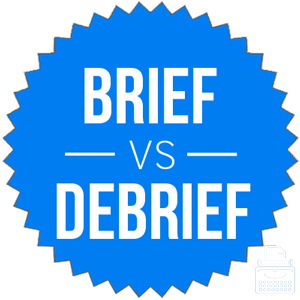Brief and debrief are verbs with a confusing relationship. Based on the structure of debrief, they would appear to be opposites. But if brief means short, does debrief really mean long?
Actually, it does not. The sense in which these words are related does not involve the length of something. Continue reading to learn more about these confusing words.
What is the Difference Between Brief and Debrief?
In this post, I will compare brief vs. debrief. I will use each word in several example sentences that shows you how it should appear in context.
Plus, I will share a memory tool that makes choosing either brief or debrief much easier next time you need one of these words.
When to Use Brief
 What does brief mean? Brief can be an adjective, a noun, or a verb.
What does brief mean? Brief can be an adjective, a noun, or a verb.
As an adjective, brief means short, like in the sentence below,
- Write a brief reflection on a session you found insightful at the conference.
As a noun, brief means a summary or short statement.
- “Did everyone read the brief I sent out via email?” asked the manager.
As a verb, brief means to prepare someone by informing him or her of necessary information.
- As his aide, it will be your job to brief the director on all meetings he does not personally attend.
When to Use Debrief
 What does debrief mean? Debrief is a verb. It means to question someone after the completion of an assignment. A spy will often debrief with his or her superiors after returning from the field, for example.
What does debrief mean? Debrief is a verb. It means to question someone after the completion of an assignment. A spy will often debrief with his or her superiors after returning from the field, for example.
Here are some more examples,
- Protocol states that all operatives must debrief with dispatchers immediately upon returning from an engagement.
- Debrief with me after the plane touches down.
Debrief can also function as a noun where it simply means a series of questions about a completed mission of assignment. This relates to the verb definition.
Debrief is a relatively young word in the history of English and was first recorded in 1944. Its origins are unknown. This period in world history was fraught with tensions, and World War II saw heavy use of spies. It is easy to speculate that this word sprang from the geopolitical tensions of the time.
Trick to Remember the Difference: Debrief vs. Brief
 Brief can be an adjective, a noun, or a verb. Debrief, on the other hand, is generally only ever a verb, as its noun use is quite limited. If you are using the word as an adjective, brief is the only choice; if you are using the word as a noun, brief is most likely the choice.
Brief can be an adjective, a noun, or a verb. Debrief, on the other hand, is generally only ever a verb, as its noun use is quite limited. If you are using the word as an adjective, brief is the only choice; if you are using the word as a noun, brief is most likely the choice.
With verbs, the situation is a little trickier.
- To brief someone is to give that person information.
- To debrief the same person would be to interrogate him, in other words, to obtain information from him.
Debrief and interrogate both have two E’s, so you can use this fact to pair the two in your mind.
Summary
Is it debrief or brief? Brief can be an adjective, a noun, or a verb. As a verb, it means to give someone a summary. Debrief is a verb that means to interrogate someone. Though they are related, they are not interchangeable, and you must use each carefully.
To summarize,
- Brief means to inform someone with necessary information
- Debrief means to interrogate someone for information about a recently completed assignment.
Contents
